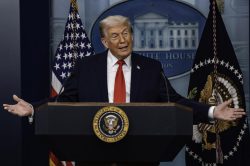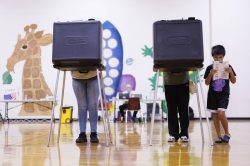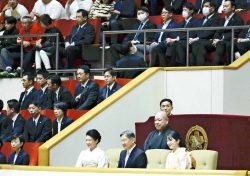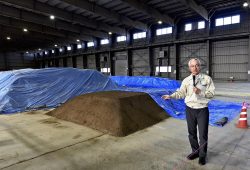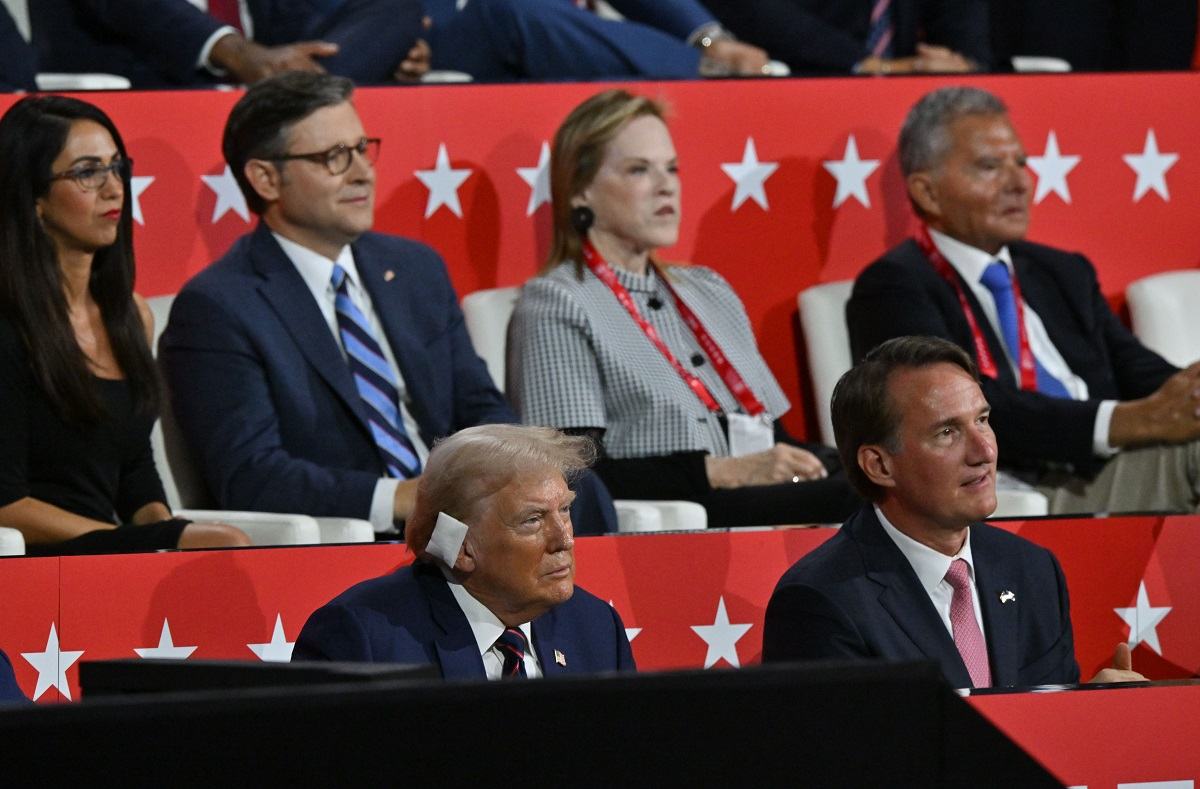
Former president Donald Trump sits with Virginia Gov. Glenn Youngkin at the Republican National Convention in Milwaukee in July.
16:27 JST, October 10, 2024
RICHMOND – Virginia Gov. Glenn Youngkin (R) has been warning that illegal immigration poses a threat to democracy as he campaigns this fall for former president Donald Trump, boasting about purging 6,303 noncitizens from the state’s voter rolls during his first 2½ years in office.
“Noncitizens will be prosecuted if they vote,” Youngkin cautioned last month during a telephone rally with Trump in which the former president spoke of an “invasion” by criminal immigrants and claimed his opponents will “cheat” to defeat him.
But a review of state court records and interviews with elections officials found no evidence that any noncitizens have tried to vote during his term in Virginia, which does not allow residents who are not citizens to vote in any elections. As few as three people have been prosecuted for illegal voting of any kind in Virginia between Jan. 1, 2022, and July of this year, the records showed. None of those cases involved a question of citizenship.
Most of the 6,303-name purge stemmed from errors on paperwork at the Department of Motor Vehicles, officials said. In many cases, legal citizens simply forgot to check a box indicating citizenship, registrars and other elections officials said. In other cases, rather than trying to evade detection, people flagged themselves as noncitizens while filling out the voter registration forms that the DMV automatically generates during routine transactions, Susan Beals, the Youngkin-appointed state elections commissioner, told lawmakers last month.
Previous governors have used the same process to remove those voters from the rolls, but Youngkin has expedited the purges – from monthly to daily – and amped up the rhetoric about the threat of noncitizen voting.
“This is the next step that we have taken, to have daily – daily – scrubbing of our voter rolls to make sure that, in fact, if an illegal immigrant either mistakenly or maliciously registers to vote, that that person will be cleaned off the ballot immediately and turned over to our prosecuting attorneys to make sure that they are prosecuted to the full extent [of the law],” Youngkin said in August during an appearance on Fox News with Sean Hannity.
A federal lawsuit filed Monday in Alexandria alleges that the Youngkin administration’s ongoing removals violate the National Voter Registration Act by making “systematic changes” to the voter rolls within 90 days of a federal election and by risking improper removal of eligible voters, particularly naturalized U.S. citizens.
Anyone removed from the rolls in error can be reinstated by affirming their citizenship to elections officials, but the suit calls that a “burdensome” step that goes beyond what is required under federal law.
“Cycle after cycle, our elections have proven to be safe and secure and still, there is a concerted, nefarious effort of state officials purging eligible citizens from the rolls based on fraudulent data and dangerous lies,” said Celina Stewart, chief executive of the League of Women Voters of the United States, whose Virginia branch brought the suit along with the Virginia Coalition for Immigrant Rights.
Youngkin spokeswoman Macaulay Porter, responding to the lawsuit and to the data referred to in this article, said in a written statement that the governor “is upholding Virginia’s voting law and carrying out his responsibility to prevent illegal votes and guarantee legal votes are counted.”
“This isn’t a Democrat or Republican issue, this is an election security issue that is being addressed according to the law,” the statement said.
Youngkin’s rhetoric about the threat of noncitizen voting is consistent with that of Republicans nationwide, who have focused on immigration as the cause of a wide range of society’s problems – from perceived election insecurity to crime, the cost of housing, interest rates, inflation and drug addiction.
As Trump continues to insist that he won in 2020, critics have said raising the specter of noncitizen voters is part of a concerted strategy by the GOP to sow mistrust in November’s outcome and lay the groundwork, should Trump lose again, for election challenges.
Del. Marcia S. “Cia” Price (D-Newport News), who chairs the House Privileges and Elections Committee, which held special hearing on the purges last month, said Youngkin’s emphasis on the topic is “dangerous rhetoric.”
“The myth that these undocumented citizens were going to vote … has been repeated across the nation, and we learned that that is absolutely not true,” Price said.
Walter Olson, a senior fellow at the Libertarian-leaning Cato Institute’s Robert A. Levy Center for Constitutional Studies, calls the right’s allegations of widespread noncitizen voting “bogus” and “dangerous” – potentially disenfranchising legitimate voters and “radicalizing people who believe these stories.”
“It tears the country apart to introduce the idea that our elections are not legitimate,” said Olson, who undertook a study of noncitizen voting across the country and came up with just a few, isolated examples over the past 20 years. “It should never be done on such flimsy evidence as they have here.”
Of Virginia’s 8.6 million residents, 457,400 are noncitizens, about half of them undocumented immigrants and the other half green-card holders, international students and others legally present in the country, according to the American Immigration Council.
While it is illegal in the United States for noncitizens to vote in federal elections, they are allowed to vote in local elections in D.C. and certain localities in three states, according to Ballotpedia. Virginia is not one of them.
Virginia requires that anyone registering to vote be a U.S. citizen, a resident of Virginia and at least 18 years old by the next general election. Felons are permanently disenfranchised in the state unless the governor restores their voting rights, a stricter standard than in most states, where felons can vote once they have completed their incarceration or other terms of their sentences.
Voting or registering illegally in Virginia is a felony, punishable by up to five years in prison.
In August, Youngkin issued an executive order aimed at promoting “election security.” While much of that order incorporated voting rules already on the books in Virginia, such as the use of paper ballots, Youngkin emphasized his attention to noncitizen voters as an important new feature.
“Call me crazy, but I think American elections should be decided by American citizens and Virginia elections should be decided by Virginians,” Youngkin told Hannity during their August interview.
State Sen. Aaron R. Rouse (D-Virginia Beach), chairman of the Senate Privileges and Elections Committee, wrote to Beals late last month and asked for proof that registrars have been discovering and referring cases of noncitizen voting to prosecutors around the state. Without that documentation, he wrote, it would seem that “unsubstantiated claims that non-citizens are voting in Virginia’s elections … [were being] improperly stoked.”
Beals’s reply, which Rouse’s office shared with The Washington Post, did not document a single case.
Price said she worries that the Youngkin administration, in its zeal to police voting, will wind up preventing qualified voters from getting access to the polls. Last year, Youngkin’s administration removed nearly 3,400 qualified voters from the rolls who were incorrectly flagged as committing repeat felonies. Most of those voters were restored in time for last fall’s elections.
Beals told Price’s elections committee that the system is structured to give voters an opportunity to respond if they are flagged as noncitizens. The information is sent to the person’s local registrar, who mails them a notification. If there is no response within 14 days, the voter is informed that they’re being removed from the rolls. It’s up to the registrar to determine if an alleged noncitizen has attempted to vote – which would be a felony – and to refer the matter to the local commonwealth’s attorney or state attorney general for prosecution.
In that hearing, Del. Phillip A. Scott (R-Spotsylvania) asked Beals what she considers to be “the biggest threat to the upcoming general election.”
Beals did not hesitate. “The operational performance of the United States Postal Service,” she said, referring to frustrating delays in processing absentee ballots. “That is my biggest concern.”
Asked by lawmakers how often voters flagged as noncitizens are prosecuted for actually trying to vote, Beals said she did not know.
Youngkin’s order states that noncitizen prosecutions are the joint responsibility of the state’s attorney general and local prosecutors. A spokesman for Attorney General Jason S. Miyares (R), who in 2022 created an “election integrity unit” with more than 20 attorneys, investigators and paralegals, said the office has not prosecuted any noncitizens for illegal voting.
The statewide data reviewed by The Post – which included records from both the Supreme Court of Virginia and the State Sentencing Commission – indicated that such prosecutions are extremely rare.
Going back 20 years, jurisdictions around Virginia reported roughly 60 convictions for illegal voting of any sort, including instances where a person tried to vote twice or had previously been disqualified from voting due to felony convictions, according to data provided by the Supreme Court of Virginia. That data did not include Fairfax County, which uses a different court record system, but the commonwealth’s attorney’s office there said no noncitizen voting cases have been recorded in recent years.
Of the guilty verdicts in those cases over the past two decades, more than half – 31 – took place in Norfolk in 2013. That year, a grand jury charged more than three dozen people with voting in the 2008 or 2012 elections while not qualified, though some were found not guilty or had the charges dismissed. The city’s prosecutor said those charges involved people convicted of felonies who had not had their voting rights restored when they cast ballots.
“Noncitizen voting is just not happening in Norfolk,” said Ramin Fatehi, the city’s Democratic commonwealth’s attorney. “We have had one such case in the last 15 years. Anyone who suggests that this is a widespread problem needs to explain why, with facts.”
Jacqueline Britt, registrar in rural Nelson County since 2009, said she has never encountered a case of a noncitizen on the voter rolls. She has received plenty of notices from the state over the years flagging alleged noncitizens on Nelson’s rolls, but said they always turned out to involve legitimate voters checking the wrong box at the DMV.
In one memorable case, the alleged noncitizen was a county official, someone born in the United States whom she had known her whole life.
Britt said she followed the standard procedure, sending the official written notice that she had been identified as a noncitizen and giving her two weeks to prove otherwise.
In Prince William County, the local elections board inquired about noncitizen voting earlier this year and registrar Eric Olsen – who has worked in elections offices in Virginia, the District and Maryland – spent several days investigating.
From May 2023 to February 2024, Prince William purged 162 voters from the rolls based on notifications from the state that they were noncitizens, Olsen found. Three-quarters of them had no voting history; 43 had cast a ballot between 2012 and 2020.
Of the 43 who had previously voted, all had been registered as citizens and had valid Social Security numbers but were flagged as noncitizens after having updated forms at the DMV. Twenty-six of those later moved or re-registered, Olsen found. While he couldn’t definitively resolve the remaining 17, the fact that they had previous status as citizens led him to conclude that the system had flagged them through errors committed on DMV forms.
“No evidence exists that any ballots were cast illegally,” Olsen concluded in his report to the electoral board. “If anything, there is ample and consistent evidence that these individuals are fully qualified U.S. citizens who have had their voter registration cancelled due to an honest mistake and poor form design.”
Olsen’s beef with the form: The way it is designed can lead to simple mistakes. The citizenship question is at the very top, he wrote, where it “could easily be confused as an ‘Office Use Only’ section” or covered by the clip of a clipboard.
Richmond registrar Keith Balmer said he knows of no illegal noncitizen voting in that city going back about a decade.
Statewide, the three illegal voting cases brought during Youngkin’s term include one charge of attempting to vote more than once, which was dismissed in Goochland County. Another involved a felon whose rights had not been restored when he voted in 2021 in Norfolk; a Democrat, he recently pleaded guilty.
The third case is set for trial later this month in Nelson County. It involves a Republican charged with trying to vote twice in last year’s local and legislative elections.
Top Articles in News Services
-

Prudential Life Expected to Face Inspection over Fraud
-

South Korea Prosecutor Seeks Death Penalty for Ex-President Yoon over Martial Law (Update)
-

Trump Names Former Federal Reserve Governor Warsh as the Next Fed Chair, Replacing Powell
-

Suzuki Overtakes Nissan as Japan’s Third‑Largest Automaker in 2025
-

Japan’s Nikkei Stock Average Alls from Record as Tech Shares Retreat; Topix Rises (UPDATE 1)
JN ACCESS RANKING
-

Univ. in Japan, Tokyo-Based Startup to Develop Satellite for Disaster Prevention Measures, Bears
-

JAL, ANA Cancel Flights During 3-day Holiday Weekend due to Blizzard
-

Japan Institute to Use Domestic Commercial Optical Lattice Clock to Set Japan Standard Time
-

China Eyes Rare Earth Foothold in Malaysia to Maintain Dominance, Counter Japan, U.S.
-

Japan, Qatar Ministers Agree on Need for Stable Energy Supplies; Motegi, Qatari Prime Minister Al-Thani Affirm Commitment to Cooperation




